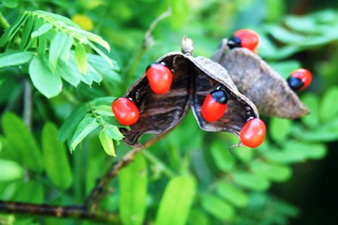Rosary Pea (Abrus precatorius)
 Better known as Rosary pea, Crab’s eye and popularly known as Gunja in Hindi, Abrus precatorius is a slender, climbing herb with peculiar bright red seeds. It can be found growing over shrubs, trees and hedges. It is one of the most toxic herbal plants because of the presence of Abrin toxins present in plant seeds.
Better known as Rosary pea, Crab’s eye and popularly known as Gunja in Hindi, Abrus precatorius is a slender, climbing herb with peculiar bright red seeds. It can be found growing over shrubs, trees and hedges. It is one of the most toxic herbal plants because of the presence of Abrin toxins present in plant seeds.
Gunja occurs in two forms normally, the one with red seeds and the other one with white seeds.
Purified Gunja preparations work well for treating painful arthritis and hair fall. It is also considered a potent aphrodiasiac.
Common Synonyms
- Sanskrit – Kakadantika, Kakasahavaya, Shikhandika, Sheetpaki, Rati
- English – Indian Licorice root, Crab’s eye, John Crow bead, Abrus seed
- Hindi – Gunchi, Gunja, Rati, Gamanchi
- Telugu – Guruvinda, Guruginia
- Tamil name – Gundumani
- Marathi – Gunj, Gunja
- Persian name – Gunchi, Chashmi, Khurosa
Occurrence
It grows in tropical and sub – tropical areas of the Indian subcontinent. Gunja has a tendency to grow as a weed and may become very invasive wherever it is grown.
Properties
- Guna (Characteristics) : Ruksha (Dry), Laghu (Light)
- Rasa (Taste) : Tikta (Bitter), Kashaya (Astringent)
- Vipaka (After taste that develops post digestion) : Katu (Pungent)
- Virya (Potency) : Ushna (Hot Potency)
Special Activity
Abrus precatorius is a very strong herb and when given in a little bit of overdose, it may lead to severe vomiting and purgation. Proper purification methods should be followed before using it for medicinal purpose.
Common Properties of the Herb
Being available in both the red and white varieties, Gunja has been studied for years for the many medicinal properties which can help take care of health in a natural way.
It is a strong aphrodisiac and works naturally to improve sexual stamina helping in dealing with sexual disorders in a natural way. People suffering from low sperm counts or other similar problems related to sperm formation can take gunja preparations as a natural herbal cure.
Having kapha and vata pacifying properties, gunja helps to manage digestive problems and improves appetite and taste.
Though in itself a very strong toxin, when used after careful purification and in regulated doses, gunja acts as a very effective anti – toxin.
It also has some beneficial effects on vision.
Wound healing improves with its use and similarly gunja helps in improving texture of the skin and hair.
Gunja also helps strengthen immunity and provides bodily strength working as a general body strengthener.
Given its amazing medicinal properties, Gunja is good for managing minor cough and cold like problems to rheumatoid arthritis, skin disorders, worm infestations, dizziness, asthma, and excessive thirst and poisoning.
Apart from the seed powder which is used for external as well as internal application, Gunja root is also effective for relieving pain.
The consistency in size and weight of gunja seeds is used as a marker for weight measurement in the Ayurvedic system of medicine, 1 gunja measures approximately 120 mg.
A word of caution
Gunja should be avoided in children and pregnant or lactating women. Though over dosage of Gunja causes poisoning but, there is no specific anti – dote required for it. It can be easily managed with proper fluid intake and mineral intake.
Recent Research on Abrus Precatorius
Ethanolic seed extracts of Gunja can help in delay the progression of cataract.
Effect On Doshas
Balances Kapha and Vata doshas.
Dosage
Root and Leaf Powder 1 -3 g,
Seed powder – ½ to 1.5 Gunja (unit of measurement) or 60 – 180 mg per day.
Useful Parts of Abrus Precatorius
Root
Leaf and Seeds



